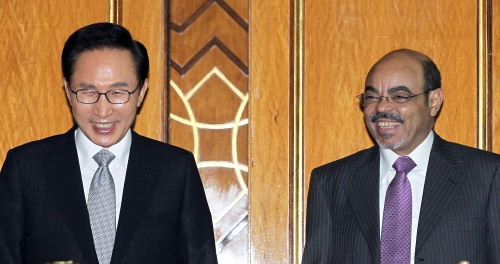Lee expressed gratitude for Ethiopia’s participation in the 1950-53 Korean War, and said South Korea wants to develop ties with Ethiopia beyond the traditional friendship into those of “development cooperation partners.”
“Ethiopian troops fought most bravely and won every battle they fought ... And 122 people lost their lives,” Lee said during a joint press conference with Meles after summit talks.
“Sixty years have passed, but the South Korean people have not forgotten their sacrifices.”
Lee said about 400 Ethiopian veterans were still alive, and South Korea plans to provide their descendants with technology training so that they can contribute to their national development.
Meles expressed a strong commitment to strengthen economic cooperation with South Korea and to learn from the country’s experience of rebuilding the nation from the ashes of war to one of the world’s largest economies, a statement from the presidential office said.
Meles told the press conference that Ethiopia is eager to share South Korea’s development experience and called for grants and loans from the Seoul government and investment from South Korean companies.
The two leaders agreed to work closely together for the success of Ethiopia’s five-year economic development scheme, known as the “Growth and Transformation Plan,” and actively share the South’s experience of developing its economy and agricultural sectors, the statement said.
They also agreed to share Seoul’s “green growth” vision for environmentally friendly growth.
Other agreed points include promoting trade and investment as well as increasing cooperation in resources and technology to help Ethiopia grow its economy in a sustainable manner, the statement said.
“I believe the relations between the two countries can be the best model in Africa,” Lee said.
Lee appreciated Ethiopia’s role in improving regional peace and stability, while Meles expressed support for Seoul’s efforts to stabilize the situation on the Korean Peninsula, the statement said.
The sides signed a grant provision agreement and other economic cooperation accords.
Calling Africa the “hope for the future of this planet,” Lee said Saturday that his country intends to work as a true partner for Africa’s development and Ethiopia will be at the heart of Seoul’s cooperation with the continent.
“Korea is ready to go hand in hand with Africa into the future. We wish to establish a partnership that will be conducive to the common growth of both Korea and Africa in the 21st century,” Lee said during a speech before students at Addis Ababa University.
“Ethiopia stands at the center of Korea’s cooperation policies toward Africa,” he said.
Lee noted that since 2000, six of 10 nations with the highest economic growth were in Africa and that the International Monetary Fund predicts that Africa’s growth rate will top that of Asia’s by 2015.
“That means that African economic development powered by its billion people will create new demand, greatly contributing to the sustained growth of the global economy in the 21st century,” Lee said during the speech at the top Ethiopian university.
Lee said South Korea “wants to be a strong partner in bolstering Ethiopia’s potential.”
Mentioning that human resources powered South Korea’s rapid economic growth, Lee said that Seoul intends to help nurture Ethiopian human resources through support in education and training.
Expressing concern about industrialization-caused deforestation in the African nation, Lee also said South Korea will help Ethiopia seek economic development in an environment-friendly way under his “low carbon, green growth” initiative.
Lee arrived in Addis Ababa earlier Friday for a three-day visit. Ethiopia is the final leg of Lee’s three-nation African tour that took him to South Africa and the Democratic Republic of the Congo. Lee is the first South Korean president to visit Ethiopia.
Ethiopia is one of 16 nations that sent combat troops as part of U.N. forces to help South Korea repel invading North Korean troops during the Korean War. A total of 6,037 Ethiopian troops were dispatched, with 122 killed and 536 injured. This year marks the 60th anniversary of Ethiopia’s participation in the war.
During the university speech, Lee reiterated his gratitude for Ethiopia.
“Their sacrifices safeguarded liberal democracy in the Republic of Korea. The Korean people will never forget your country, Ethiopia, which gave us a helping hand at a time when our countries did not even have diplomatic relations,” he said.
Lee also gave words of encouragement for students. Recalling his experience of overcoming poverty and becoming a CEO and then president of South Korea, Lee told Ethiopian students to never give up and to keep challenging themselves.
“Young people need to keep a flame of hope in their hearts. We have within us endless abilities and remarkable creativity. But unless we challenge ourselves, those inner potentials remain hidden,” he said. “I am here to tell you, do not fear poverty or failure, and challenge yourselves over and over again.”
By Kim So-hyun and news reports (
sophie@heraldcorp.com)








